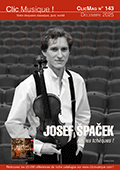 Pour qui voudrait goûter aux quatuors de Haydn sans arriver à choisir parmi une copieuse « carte » de près de 70 œuvres, voilà une sorte de « café gourmand » qui ne se refuse pas. Un peu plus de 15 ans séparent l’encore bien sage opus 17/5 du plus expérimental « Trost » op.54/2, mais chacune des trois œuvres du programme recèle son lot de surprises. Souvent elles sont dues au compositeur, comme le Trio du Menuet du premier, récitatif et air d’opéra confiés à un premier violon très « diva éplorée », ou le célèbre Finale de l’opus 33/2 qui a piégé en concert plus d’un auditeur non averti. Mais les interprètes ne sont pas en reste pour ajouter leur grain de sel, comme dans le Trio du Scherzando de ce même opus 33/2, envahi de « glissando viennois » auto-parodique au point de ressembler à des miaulements de chat… Est-ce à dire que l’épatant quatuor Bennewitz (qui fête cette année ses 25 ans) en fait trop, qu’il a trop de goût pour l’anecdote ? Peut-être... Mais avec un tel chic, une telle qualité de son (bravo au passage au responsable de la captation) et de mise en place, qu’il est difficile de résister. Mais quoi, plaisir coupable n’est pas péché mortel ! (Olivier Eterradossi)  During the 18th century, the string quartet gained the position of the most valued and most challenging chamber music genre, and gradually became a vehicle for conveying the composer’s personal feelings. Joseph Haydn played a key role in forging the quartet’s classical form. He created almost 70 string quartets, which, along with the symphonies, constitute the largest, as well as the most significant, part of his oeuvre. Haydn accorded them the form that would serve as the model for Mozart, Beethoven and later composers. Just as fascinating as the quantity is his quartets’ sheer diversity, with each of them being singular, featuring novel (often humorous) ideas, experiments, as well as constant seeking of new possibilities of expression. The three quartets included on the present album chart the development of Haydn’s musical idiom, from Op. 17 (1771), which he wrote at the age of 40, through Op. 33, dubbed “Gli Scherzi” (1781, dedicated to the Grand Duke of Russia Pavel Petrovich, the future Tsar Paul I), to the formally experimental pieces making up Op. 54 (1788). The Bennewitz Quartet have given numerous concerts worldwide, including at the most prestigious venues (Wigmore Hall in London, Musikverein in Vienna, Konzerthaus in Berlin, Théâtre des Champs-Elysées in Paris, concert halls in New York, Seoul, etc.) and such renowned festivals as the Salzburger Festspiele, Lucerne Festival and Rheingau Musik Festival. At many of them, they have performed quartets by Haydn, one of their favourite composers, whose music they endow with a transparent sound, revealing their levity and sense for detail.
 |
